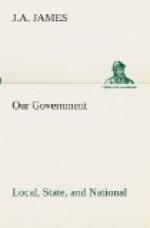Tariff Laws.—A tariff is the list of the rates of duties fixed by law. An importer of foreign goods must consider the amount of the duties he has paid as part of the cost of the goods when he sells them. If a higher price is caused in this way, less of such goods will be imported and the production of the goods in this country will be encouraged. Consequently, high rates of duties may have a decided influence upon the industries of a country. When the rates of duties are so fixed as to bring about this result, we have a protective tariff; i.e., one under which persons can produce in this country certain articles which otherwise they could not produce, because of their cheapness when imported from a foreign country. The duties are made so high that it is not profitable to import the articles. When rates of duties are fixed primarily with the object of raising revenue, and without regard to their effect upon the industries of the country, we have a tariff for revenue. This kind of tariff is generally meant when the term free trade is used. Articles on which no duties are imposed are said to be on the free list. There is no country which fails to collect duties on some of its importations.
Reciprocity Agreements.—The United States has entered into reciprocity treaties with various countries for securing the reduction of tariff rates. Each country agrees to admit certain products of the other country at reduced rates, or free of duty. These are generally commodities in the production of which there is little or no competition between the parties to the treaty.
Internal Revenue Taxes.—Excises are taxes laid upon the manufacture and sale of certain products within the country. At the present time these internal revenue taxes are levied by the National government upon liquors,[23] tobacco, snuff, opium, oleomargarine, filled cheese, mixed flour, and playing cards. The greater number of these taxes are paid by the purchase of stamps, which must be affixed, in the proper denominations, to the articles taxed. When the packages are broken, the stamps must be destroyed so that they cannot be used again.
[Footnote 23: Taxes are levied, not only upon the liquors themselves, but upon the business of brewing and rectifying; of selling by wholesale and by retail; of manufacturing stills; and upon the stills themselves. A list of these taxes may be obtained from the collector of any internal revenue district.]




